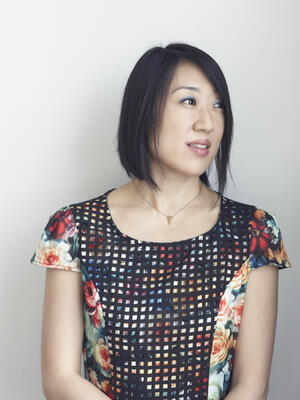
News
Summers Will Not Finish Semester of Teaching as Harvard Investigates Epstein Ties

News
Harvard College Students Report Favoring Divestment from Israel in HUA Survey

News
‘He Should Resign’: Harvard Undergrads Take Hard Line Against Summers Over Epstein Scandal

News
Harvard To Launch New Investigation Into Epstein’s Ties to Summers, Other University Affiliates

News
Harvard Students To Vote on Divestment From Israel in Inaugural HUA Election Survey
Defeating the Perfectionist: Young Jean Lee Brings Her Playwriting Workshop to Harvard

Named the “most adventurous downtown playwright of her generation” by the New York Times, Young Jean Lee offered a session of her tried-and-true playwriting workshop in partnership with Harvard’s Theater, Dance, & Media department on Friday, Oct. 9. Lee led a group of about twenty student writers through a series of generative prompts aimed at giving each attendee a new, developed idea for a play.
Lee, a playwright, director, and filmmaker, is often commended for her experimentality, humor, and use of the avant-garde. Lee was the first Asian-American woman to have a play produced on Broadway when her piece “Straight White Men,” was performed at the Hayes Theater in 2018. Lee is currently an Associate Professor of Theater and Performance at Stanford University, where her playwriting workshop has been in development for the past three years. At Stanford, her workshop method has produced a plethora of work, with Lee referring to it as a “factory” that cultivates new works for production at the university.
Structured in three distinct parts, Lee’s workshop prioritized accountability, messiness, and defeating the perfectionist in the writer's mind. The first set of prompts were designed to help attendees produce a span of ideas for a play and the second set to spur attendees into writing the actual play. The final segment included a Q&A session in which Lee checked in with each and every participant. The rules, as set by Lee, included writing as fast as the attendees were able and not deleting anything. (Thinking too much would bog down writers and allow them to give in to their inner perfectionists.) Though participants did not share their ideas and what they were working on with the group, after each section there was time set aside for troubleshooting and reflection with Lee.
“I would encourage you not to reread or edit anything that you write for the same reasons. Because the key is just to generate pages. And the reason why generating pages is so useful is because you are learning about your play as we generate those pages,” Lee, in urging students to just write and get their ideas out there, said. “So the purpose of generating the pages is not to create something beautiful. It's to figure out who your characters are, what you're interested in, what you're not interested in and what your style is.”
“Much of my life I feel like I operate on this concept of diminishing marginal returns, where it’s like, you just take the first step and then every additional step is less and less monumental for the ultimate product,” said attendee Eric J. Cheng ’20, a fan of the workshop’s “just do it” attitude. “And so I really think that in [these] three hours, I probably achieved maybe what I would have in 2 months of being like: Oh I have this play idea; oh, I’m not gonna write it; oh, I’m gonna write it when I really have it fleshed out.”
Alice J. Findlay ’22, who tuned into the workshop from the United Kingdom, noted that despite the time difference, she was surprised at just how much she was able to create. “I think the exercise that was just: Write something as badly as you can. [Giving myself] permission to write badly really helped me just continue pushing through even though I knew what I was writing was rubbish. But it was really nice to actually have something to start with and have somewhere to go from there and not just be staring at a blank screen.”
“I was honestly really struck by just how accessible everything that she was teaching us was,” said attendee Natalie J. Choo ’22, a self-proclaimed playwriting beginner. “But I felt like the whole time what she was saying, and the prompts that she gave us — the exercises that she took us through, were very accessible for someone who didn’t really have a lot of playwriting experience and also just very applicable to other areas of creating art and just going through life in general.”
Lee’s workshop was one event in a series of workshops and artist talks that the Theater, Dance, & Media is offering for students and affiliates this fall.
Want to keep up with breaking news? Subscribe to our email newsletter.
